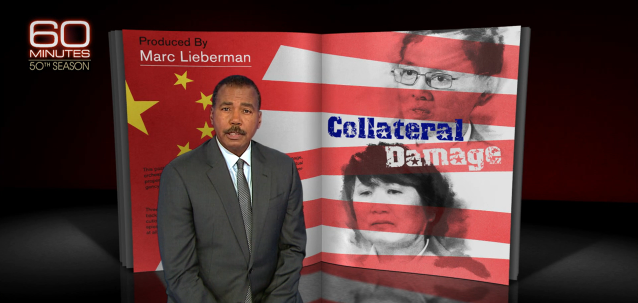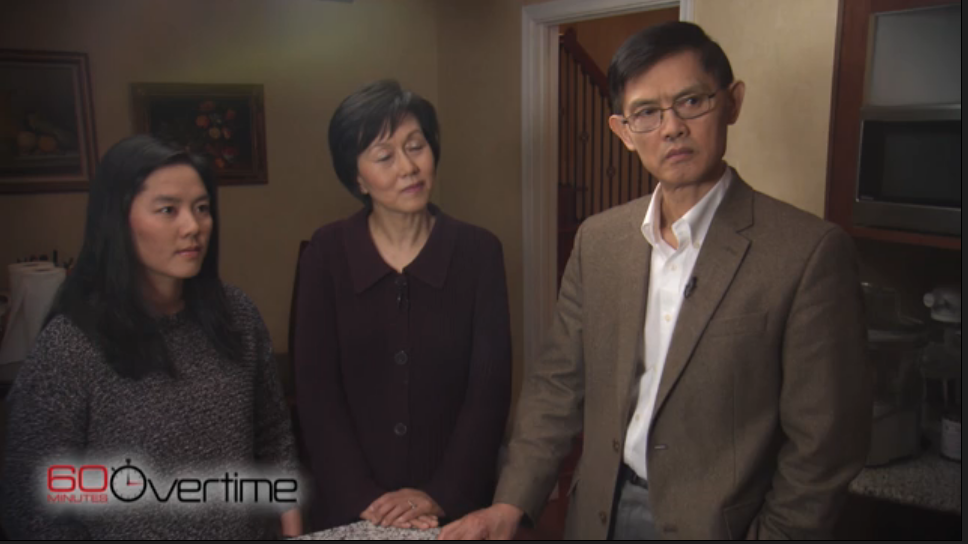Racial Profiling
2018/12/07 FBI Meeting
|
On December 7, 2018, a group of community leaders met with a senior-level FBI official and representatives at the FBI headquarters to convey concerns raised within the Chinese American community about the role of bias in its investigations, among other issues. A public statement about the meeting is here: English | 中文 .
Each of the five community leaders brought his/her talking materials to the meeting with the FBI official and representatives:
Additional Background
|
"Collateral Damage" and "The Spy Who Wasn't"
|
Profiling of Asian Americans
On August 26, 2018, CBS 60 Minutes rebroadcast "Collateral Damage" nationwide with updates on the stories of Sherry Chen and Professor Xiaoxing Xi. Bill Whitaker reported on these and other innocent Chinese Americans wrongly accused of espionage-related crimes as the U.S. steps up the fight against Chinese theft of U.S. trade secrets and intellectual property.
60 Minutes Overtime, titled "The Spy Who Wasn't," further describes that "[a]s innocent Chinese Americans are being accused as spies, the impact on them and their families lasts far beyond the legal fees and dropped charges." Sherry Chen and Professor Xiaoxing Xi are not the only Asian American victims of racial discrimination in U.S. history. Collateral damage for Chinese American scientists is also not a recent occurrence by random chance. The Chinese Exclusion Act prohibited all immigration of Chinese laborers beginning in 1882. Subsequent amendments expanded the exclusion to all Asians. It was one of the most egregious discriminatory laws based on race and national origin in U.S. history. The Chinese Exclusion Act and its amendments were not repealed until 1943, and even then, disproportionate immigration quotas were applied to Asians until 1965. During the Second World War, about 120,000 Japanese men, women and children were interned under Executive Order 9066, about two thirds of them were native-born American citizens. Most of them were uprooted from their homes in the West Coast and sent to relocation centers for suspicion of disloyalty to the United States. In combination with these historical and stereotypical backgrounds, the current state of profiling of Chinese Americans is further entrenched by:
In total or in part, these factors have led some innocent Asian Americans to recent persecutions as explicit targets, collateral damage, and convenient scapegoats in the name of national security. Racial profiling is legally and morally wrong. |
Racial Profiling
The use of race, ethnicity or national origin as grounds for suspecting someone of having committed an offense
Mistake
An action or judgment that is misguided or wrong
Stereotype
An over-generalized belief about a particular category of people
Implicit Bias
Attitudes or stereotypes that affect our understanding, actions, and decisions in an unconscious manne
Social Stigma
disapproval of, or discrimination against, a person based on perceivable social characteristics that serve to distinguish them from other members of a society
Prejudice
Harm or injury that results or may result from some action or judgment
Discrimination
The unjust or prejudicial treatment of different categories of people or things
Recommended Reading
Harvey Silverglate (2011) Three Felonies A Day: How the Feds Target the Innocent |



